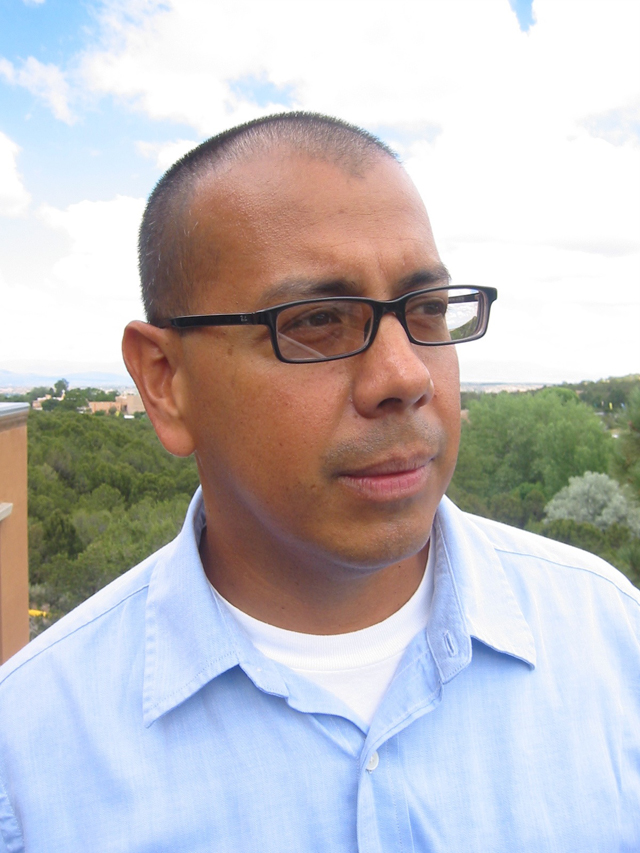Dr. Jesse Aleman
2015 Jim & Linda Burke Visiting Scholar

Professor of English at the University of New Mexico. His scholarship and teaching cover two fields:nineteenth-century American literature and US Latino/a literary histories. His work focuses on the literary production and national identities that were forged after the 1846-1848 U.S.-Mexico War. He has over a dozen articles in scholarly journals and edited collections, including recent publications in American Literary History, The Oxford Handbook to Nineteenth-Century American Literature, and Hemispheric American Studies. He reprinted Loreta Janeta Velazquez’s 1876 autobiography, The Woman in Battle, which recounts the adventures of a Cuban woman who cross-dressed as a Confederate soldier to fight in the U.S. Civil War, and he co-edited Empire and the Literature of Sensation, which is an anthology of nineteenth-century popular literature about U.S. imperialism in Mexico and Cuba. He is currently working on “Wars of Rebellion,” a book that places US Hispanic writings about the Civil War in relations to contemporaneous civil wars in Cuba and Mexico, as well as “The Latino/a Nineteenth Century,” a co-edited anthology of essays.
Besides nineteenth-century American and Chicano/a literatures, his other teaching interests include the nineteenth-century American gothic; southwestern literature and film; and theories of the novel. As a UNM faculty member, he is the recipient of the College of Arts and Sciences’ Award for Teaching Excellence; the American Indian Student Services’STARS Award; the Wertheim Award for Outstanding English Faculty member; and he’s been named Outstanding Faculty Member by the English Graduate Student Association and UNM’s Peer Mentoring for Graduate Students of Color. As a recurring summer faculty member of Middlebury College’s Bread Loaf School of English, he’s been awarded the Ruth and Lillian Marino Endowed Chair for teaching excellence.
In late May and early June, Professor Alemán’ interacted with students in Martin Wallen's Taos seminar,"The Nuclear Bomb and the Land of Enchantment."On Sunday, May 31,he gave a free talk titled "From Atomic Ants to Texas Cannibals: The Social Significance of Southwestern Horror in Film.” The presentation took place at 2:00 p. m. in the Nicolai Fechin House/Taos Art Museum.
To see this event featured in the Taos News, view the May 30th article by Laura Bulkin here: 'Taos Lecture: From Atomic Ants to Texas Cannibals'
Talk: "FROM ATOMIC ANTS TO TEXAS CANNIBALS: THE SOCIAL SIGNIFICANCE OF SOUTHWESTERN HORROR IN FILM."
Location: NICOLAI FECHIN HOUSE, TAOS ART MUSEUM
The talk held on Sunday, May 31, 2015 focused on the Atomic age and the decline of the cattle industry as two separate regional events that shape the emergence of Southwestern horror in films. Rather than focus on southwestern horror flicks, the focus was on Southwestern horror in film instead, meaning it examined how economic, cultural, environmental, and historical conditions specific to New Mexico and Texas respectively generate specific forms of horror in films about nuclear testing and cattle culture. For New Mexico, for instance, the Atomic age brought with it environmental disaster that takes cinematic form in mutant creatures and cannibalistic natives, while the large scale decline of cattle country across Texas inspired some of the most innovative technical forms of cinematic horror, ranging from The Texas Chainsaw Massacre to No Country for Old Men. Clips from a handful of movies were screened, spanning the 1950s to the present, to view how the uneven environmental and economic changes that have plagued the southwest and its populations create specific forms of horror with considerable social significance beyond the region.
